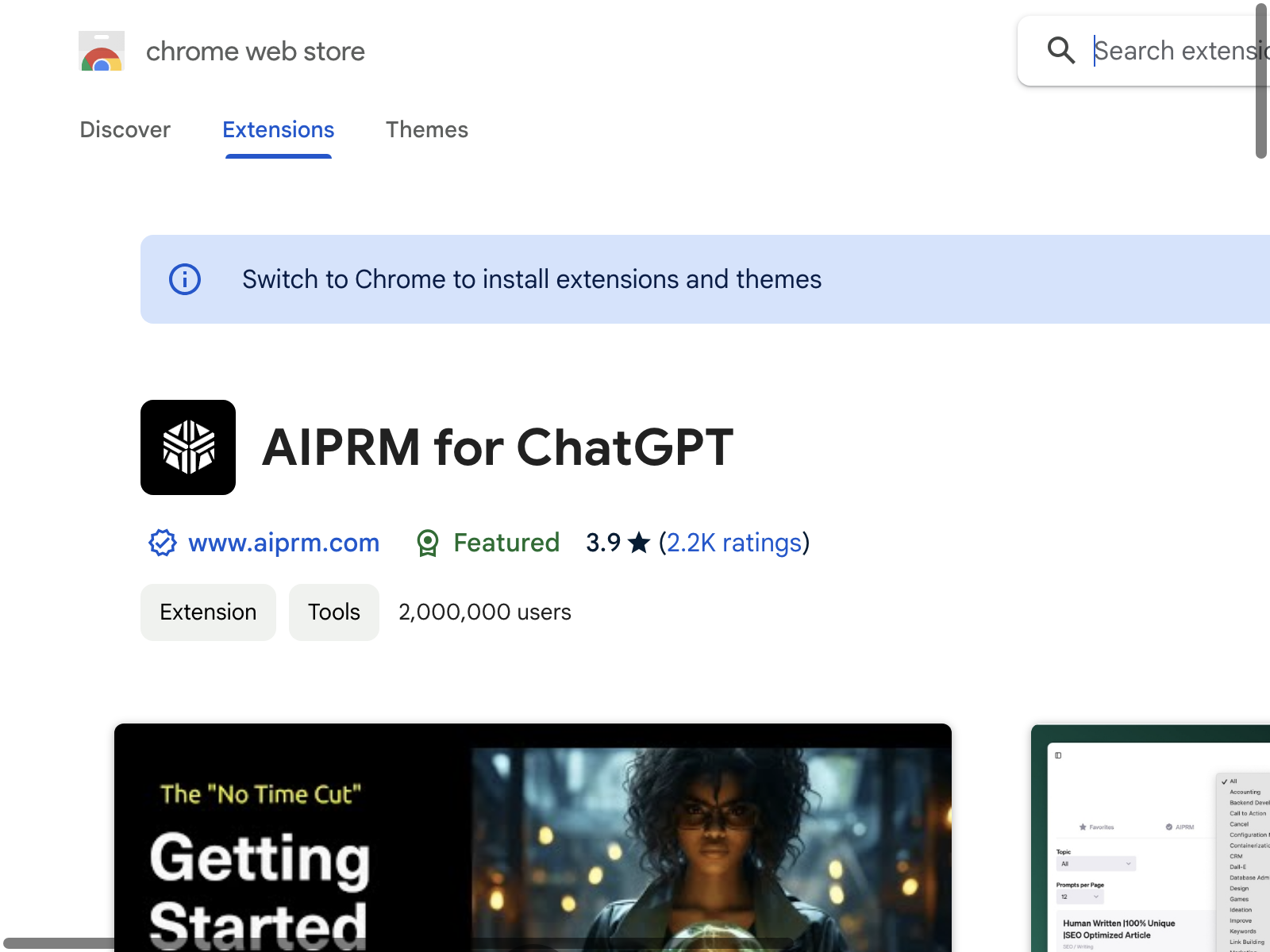AIPRM - Review, Pricing, Alternatives, Pros & Cons
AIPRM is a powerful AI tool specifically designed to enhance the capabilities of OpenAI's ChatGPT. It provides users with a curated list of prompt templates and advanced features, allowing them to have more engaging and tailored conversations with the AI language model. In this review, we'll dive deeper into the features, use cases, and pros and cons of AIPRM.
Published on
One of the standout features of AIPRM is the extensive library of prompt templates it offers. These templates have been carefully designed to prompt ChatGPT to generate high-quality responses in various contexts. Whether you're looking to draft content, engage in interactive storytelling, or practice language conversationally, AIPRM has a prompt template to assist you. This eliminates the need to come up with prompts from scratch, saving users time and effort.
But AIPRM doesn't stop at prompt templates. It also introduces advanced features that enhance the user experience with ChatGPT. One of these features is context management, which allows users to maintain context between turns. This enables more coherent and consistent conversations with ChatGPT, making the interactions feel more fluid and natural. Additionally, AIPRM provides response customization, allowing users to influence the style, tone, and level of detail in the generated responses. This ensures that the AI's output aligns with the user's intentions and desired outcome.
Another notable feature of AIPRM is its personalization capability. Users have the option to create and save their own prompt templates, tailoring the AI's behavior to suit their specific needs and preferences. This level of customization allows for a more personalized and tailored conversation with ChatGPT.
In addition to these features, AIPRM also offers real-time suggestions while users type. These suggestions can be incredibly helpful in enhancing the efficiency of conversations and minimizing guesswork.
Now, let's take a look at some of the main use cases for AIPRM.
- Content drafting and ideation: AIPRM provides prompt templates for generating various types of content, such as blog posts, social media captions, and product descriptions. It assists users in brainstorming ideas and crafting well-structured content quickly and efficiently.
- Interactive storytelling: With AIPRM's prompt templates for character development, plot twists, and dialogue generation, users can create dynamic and engaging narratives. This feature is especially useful for writers or anyone interested in exploring the creative realm.
- Language learning and practice: AIPRM offers prompt templates tailored to language learning scenarios. Users can engage in conversational practice and receive AI-powered feedback to improve their language skills.
- Professional communication: AIPRM comes in handy when composing professional emails, drafting engaging social media responses, writing persuasive sales pitches, and other forms of professional communication. It helps users craft impactful and effective messages.
While AIPRM offers a range of valuable features, it's important to consider the pros and cons before making a decision.
Pros:
- Extensive library of prompt templates: AIPRM provides users with a wide range of prompt templates, covering various scenarios and use cases. This allows for greater creativity and flexibility in conversations with ChatGPT.
- Advanced features for context management and response customization: AIPRM's context management feature enables users to have more coherent and consistent conversations with ChatGPT. Additionally, the response customization feature empowers users to shape the AI's output to align with their goals and intentions.
- Saves time and effort: By providing prompt templates, AIPRM eliminates the need to come up with prompts from scratch. This saves users time and effort, allowing them to focus more on the conversation itself.
- More engaging and tailored conversations: AIPRM's features work together to provide users with more engaging and tailored conversations with ChatGPT. Users can explore various scenarios and generate high-quality responses effortlessly.
Cons:
- Currently only available for ChatGPT: AIPRM is currently developed specifically for ChatGPT and may not be compatible with other AI language models. This limits its usability for users who prefer other models.
- May require a learning curve: While AIPRM offers a user-friendly interface, fully leveraging all the features may require a learning curve. It may take some time for users to explore and understand the full potential of this tool.
- Limited to the prompt templates provided by AIPRM: Although users can create their own prompt templates, the limitations lie in the templates provided. Users may encounter situations where none of the templates fully align with their specific needs or circumstances.
It's essential to consider these pros and cons to determine if AIPRM is the right tool for you.
In terms of pricing, AIPRM for ChatGPT is available as a Chrome extension. The pricing details can be found on the official AIPRM webpage.
FAQs
-
Is AIPRM compatible with other AI language models?
- Currently, AIPRM is designed specifically for ChatGPT and may not be compatible with other AI language models.
-
Can I customize the prompt templates?
- Yes, AIPRM allows users to create and save their own prompt templates, enabling customization and tailoring of the AI's behavior to suit specific needs and preferences.
-
Is AIPRM compatible with all versions of ChatGPT?
- AIPRM is compatible with ChatGPT, but it's important to ensure compatibility with specific versions. Compatibility information can be found on the official AIPRM webpage.
-
Are there any limitations on the usage of AIPRM?
- While AIPRM offers a range of features, users should be aware of the limitations in terms of prompt templates provided by the tool. Although users can create their own templates, there may be situations where the desired prompt is not available.
For answers to these frequently asked questions and more, visit the official AIPRM webpage.

